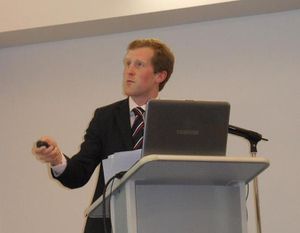User:Simon Harley

My name is Simon Harley and I am a thirty-eight year old researcher of the Royal Navy in the Dreadnought Era.
I currently live on the North-West coast of England. For the past 16 years I've been accumulating material on the Royal Navy Flag Officers of the Great War, which will eventually form the basis of a multi-volume history of the Royal Navy, from Lord Fisher's going to sea up to the Treaty of Versailles. By providing a background to these Flag Officers' services from 1854 to 1914, their actions in the Great War will be put into their proper context.
During the COVID-19 pandemic, and the consequent closure of archives, I started a new project on cordite handling at the Battle of Jutland which has (as of March 2024) matured into a 600 page work on the subject.
If you have any questions or material relating to the subjects of this website, please get in touch or email me at simon AT-SIGN dreadnoughtproject.org. I would be especially happy to hear from descendants of naval officers who served in the late 19th and early 20th centuries.
My personal website and blog can be found at http://www.simonharley.com.
Elected an Associate Fellow of the Royal Historical Society in 2024.
One of the first recipients of the Colin Bell Award from Churchill College, Cambridge.
Invited to present a paper at the 2017 McMullen Naval History Symposium at the United States Naval Academy.
Speaker at the 2013 New Researchers in Maritime History Conference hosted by the British Commission for Maritime History.
Author of:
- "'It's a Case of All or None': 'Jacky' Fisher's Advice to Winston Churchill, 1911". The Mariner's Mirror. 102 (2): 174–190. doi:10.1080/00253359.2016.1167397.
- "'A Distinct Point in Modern Naval Tactics'". The Mariner's Mirror. 102 (3): 325–330. doi:10.1080/00253359.2016.1202488.
- "Vice-Admiral Bethell's Third Fleet Battle Orders, about 1914". The Mariner's Mirror. 102 (4): 442–443. doi:10.1080/00253359.2016.1240978.
- "The Promotion of David Beatty to Rear-Admiral". The Mariner's Mirror. 103 (2): 213–216. doi:10.1080/00253359.2017.1304709.
- "War Course Attendance at Greenwich from 1900 to 1904". The Mariner's Mirror. 103 (4): 471–474. doi:10.1080/00253359.2017.1348040.
Links
- Library — A list of some of my books. I'm always willing to share information or the books themselves on request.
- Archives — A list of some of the archival (i.e. primary) sources I have and need. If you can help acquire them, or are interested in the contents of some of them, please get in touch.
- Acknowledgements — Research like this requires a lot of time, luck, effort, and help.
External Links
Works in Progress
Far too many to list.
Review copies of new publications are always welcome.